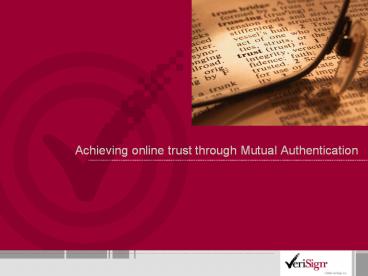Achieving online trust through Mutual Authentication - PowerPoint PPT Presentation
1 / 19
Title:
Achieving online trust through Mutual Authentication
Description:
ONLINE AUCTION USER ID, PASSWORD, OTP. Application. Online Auction. USER ID, PASSWORD, User Store. TOKEN ID. VIP OTP Validation Engine. Token Store ... – PowerPoint PPT presentation
Number of Views:41
Avg rating:3.0/5.0
Title: Achieving online trust through Mutual Authentication
1
Achieving online trust through Mutual
Authentication
2
Agenda
- Where do we need trust online?
- who are the affected parties?
- Authenticating the site to a consumer
- V by V and SecureCode, next generation browsers
- Authenticating the consumer to a site
- strong authentication options
3
Where do we need trust online?
For it is mutual trust, even more than mutual
interest that holds human associations together.
H. L. Mencken (1880 - 1956)
4
Where do we need trust online?
For any online interaction where consumer
confidence would be eroded if a fraudster could
gain value from intercepting or changing data
such as.
5
Authenticating the consumer to a site
- For financial payments
- CVV2
- Address verification
- For bank account management
- Almost always user name and ID
- Some pioneers (Lloyds TSB, Alliance Leicester)
- For online service providers account management
- Almost always User Name and ID
- Some pioneers (eBay, PayPal, MicroSoft, Yahoo)
6
Authenticating the site to a consumer
Trust in Allah, but tie your camel Old Muslim
Proverb
7
Authenticating the site to a consumer - Today
8
Authenticating the site to a consumer Future
- SSL and browser providers working together
- to help fight fraud
- Display security and site authenticity
- method depends on browser
- Standards (nearly) complete for IE7, vary by
browser - based on authentication procedures for High
Assurance certificates - Higher security browsers are available today
- Netscape / Firefox available, IE7 (85 share)
late 2006
9
Internet Explorer 7 user experience
10
Internet Explorer 7 user experience
11
Authenticating the consumer to a site
All men are frauds. The only difference between
them is that some admit it. I myself deny it.
H. L. Mencken (1880 - 1956)
12
Authenticating for financial payments CVV2 AVS
13
Authenticating the consumer to a site future
- Two factor or strong authentication, many form
factors - token, phone, application on PC, bingo card
- Many models for authentication
- must reflect security requirements AND consumer
acceptance - Shared token makes financial sense, helps
acceptance - Financial Payments
- Bank Account Management
- AND Online Service Provider Account Management
14
Many form factors
HARD
SOFT
Digital Certificate
OTP Token
Desktop Soft Token
Smart Cards
Mobile Phone
VIP Two-FactorAuthentication
Fixed Phone (voice)
Multi-Function Devices
15
Many models for authentication
- VeriSign have identified 5 models for the UK
banking and retail community - Traditional
- EMV CAP
- Closed user group trusted 3rd Party
- Open user group trusted 3rd Party (VIP)
- Hybrid ( EMV CAP and VIP)
- 1st draft of White Paper available
- Will be distributed to contacts within banking
and retail community
16
Open group trusted 3rd party
End User
17
VeriSign Identity Protection Network (VIP)
- Invisible or Web Lifestyle Friendly Security for
Consumers - Comprehensive Turn-Key Solution for Online
Services
Intelligent Infrastructure for ID Protection
From the Leading Internet Infrastructure Operator
18
Inspired by the offline world
- An ATM card works across all the Banks on the
Cirrus Network - A VIP Device Works Across all the Web sites on
the VIP Network
19
Achieving online trust through Mutual
Authentication































